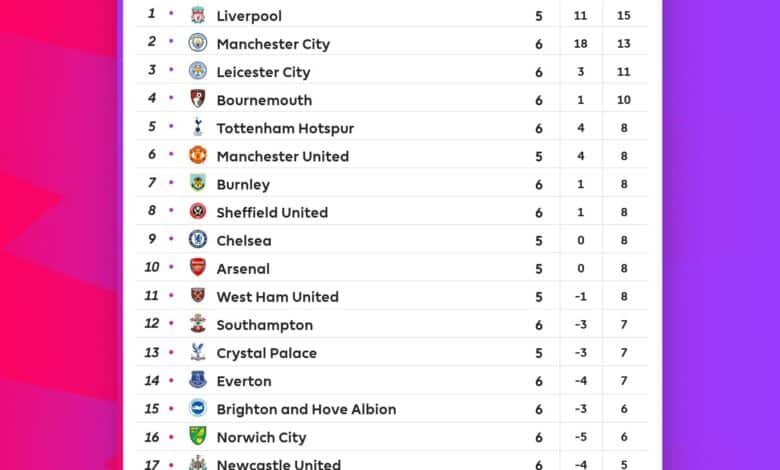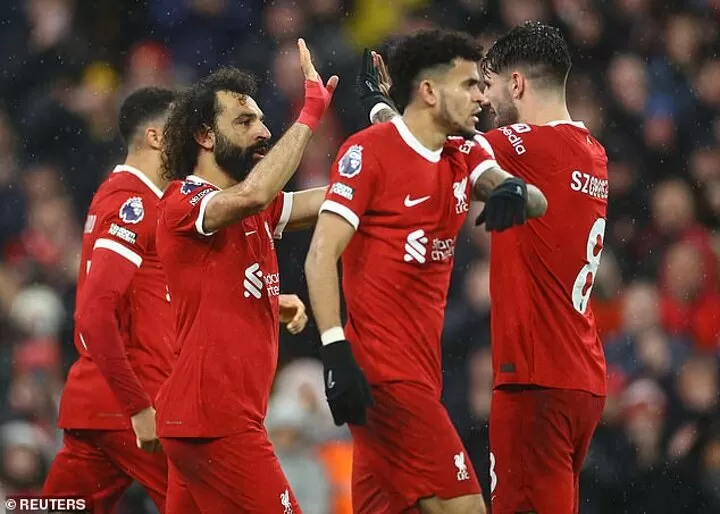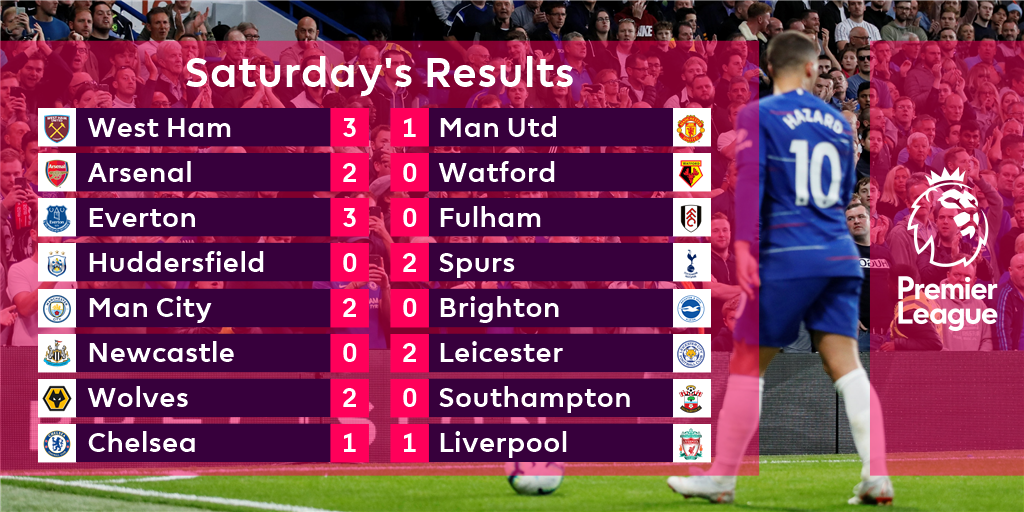Today P L: Unlocking the Secrets of Premier League Success

Planning your day effectively can transform your productivity. Today P L, or “Today Personal List,” is a simple tool to help you manage tasks.
In our busy lives, staying organized can be a challenge. That’s where Today P L comes in. This personal list method helps you prioritize your daily activities. It ensures you focus on what really matters. By creating a clear plan, you can reduce stress and increase efficiency.
Whether for work or personal goals, Today P L keeps you on track. It’s a straightforward approach that anyone can use. Ready to make the most of your day? Let’s dive in and see how Today P L can help you stay organized and productive.
Introduction To Premier League
The Premier League, often referred to as the EPL (English Premier League), is one of the most popular football leagues in the world. It showcases top-tier football talent and thrilling matches. Fans globally tune in to watch their favorite teams compete. But how did this league come to be? Let’s delve into its history and evolution, and its global influence.
History And Evolution
The Premier League began in 1992. It replaced the old First Division as the top English football league. The main goal was to bring more money into the sport. Clubs wanted better TV deals and more control over their finances. The first season saw 22 clubs compete. Over the years, the number of teams was reduced to 20.
Since its inception, the league has grown significantly. It has become a global phenomenon. Teams like Manchester United, Liverpool, and Chelsea are now household names. The quality of football has improved, attracting top players from around the world. The competition is fierce, and every match is a spectacle.
Global Influence
The Premier League’s global reach is unmatched. It is broadcasted in over 200 countries. Millions of fans watch the games live. This international exposure has boosted the league’s popularity and revenue. Merchandise sales, international tours, and fan clubs have grown exponentially.
Many foreign players and managers have joined the league. This has brought diverse playing styles and strategies. It has also led to cultural exchanges and greater understanding among nations. The Premier League has become a melting pot of talent and tradition.
These factors have not only made the Premier League exciting but also influential. Its impact on global football is profound. Clubs and players aspire to be part of this elite league. The Premier League continues to set the standard for football leagues worldwide.

Credit: m.allfootballapp.com
Key Factors For Success
Understanding the key factors for success in Today P L is essential. These factors determine the overall performance and achievements of any team. Two crucial aspects are Financial Power and Player Talent.
Financial Power
Financial power plays a significant role in Today P L. Teams with strong financial backing can invest in top-tier talent. They can also afford the best training facilities and staff. This sets the foundation for success.
Key financial elements include:
- Player Transfers: Teams can buy the best players.
- Infrastructure: Better stadiums and training grounds.
- Marketing: Stronger brand presence and merchandise sales.
Teams with greater financial resources often outperform others. This is due to their ability to attract and retain top talent.
Player Talent
Player talent is another critical factor. Having skilled players can significantly impact a team’s success. Talent development and scouting are also vital.
Key elements of player talent include:
- Skill Levels: Higher skill levels lead to better performance.
- Experience: Experienced players handle pressure better.
- Team Chemistry: Good relationships improve teamwork.
A team with talented players often dominates the league. Their skill and experience give them an edge over competitors.
In conclusion, both financial power and player talent are essential for success in Today P L. By focusing on these factors, teams can achieve greater performance and success.
Role Of Management
Management plays a crucial role in the success of any organization. It involves planning, organizing, leading, and controlling resources to achieve specific goals. Effective management ensures that the team works cohesively towards common objectives.
Coaching Strategies
Coaching is an essential part of management. It helps employees develop skills and improve performance. Effective coaching strategies include:
- Setting Clear Goals: Define what needs to be achieved.
- Providing Feedback: Offer constructive criticism regularly.
- Encouraging Self-Reflection: Help employees understand their strengths and weaknesses.
- Offering Support: Be available to assist and guide.
Using these strategies can lead to better employee engagement and productivity.
Leadership Styles
Management often involves different leadership styles. Each style impacts the team in unique ways. Common leadership styles include:
| Style | Description |
|---|---|
| Autocratic | Leaders make decisions without input from others. |
| Democratic | Leaders include team members in decision-making. |
| Transformational | Leaders inspire and motivate employees to exceed expectations. |
| Transactional | Leaders use rewards and punishments to manage performance. |
Choosing the right leadership style depends on the team’s needs and organizational goals.

Credit: twitter.com
Tactical Innovations
Today P L teams use advanced tactics to stay ahead. Tactical innovations are key to their success. Managers explore new formations and systems. They also make quick in-game adjustments. Let’s dive into these exciting changes.
Formations And Systems
Formations are the backbone of any team. Managers often switch between different setups. The 4-3-3 and 3-5-2 formations are popular. They offer balance and flexibility. Each formation serves a unique purpose. The choice depends on the opponent and game plan.
Systems go beyond formations. They include pressing styles and passing patterns. Some teams prefer high pressing. Others focus on quick counter-attacks. Each system has its pros and cons. Managers study the strengths and weaknesses of their squad. Then, they choose the best system to maximize performance.
In-game Adjustments
In-game adjustments are vital in modern football. Managers watch the game closely. They make changes based on the flow of play. Substitutions are a common tactic. Fresh legs can change the game’s pace. Tactical shifts also occur. A team might switch from attacking to defending.
Adjustments often involve player roles. A winger may move to a more central position. A midfielder might drop deeper to help the defense. These changes can surprise the opponent. They create new challenges and opportunities.
Youth Development
Youth development is a cornerstone of Today P L’s success. Investing in young talent ensures the future of the club. The youth development program focuses on nurturing skills, discipline, and passion for the game. This section will delve into the academy systems and the pathway to the first team.
Academy Systems
Today P L has state-of-the-art academy systems. These academies are designed to identify and groom young talent from an early age. The clubs employ experienced coaches who focus on both technical and mental aspects of the game.
Key Features of Academy Systems:
- Age-specific training programs
- Advanced facilities and equipment
- Regular assessments and feedback
- Health and nutrition guidance
The academy systems also prioritize education. Players attend school while training to ensure they have a balanced development. This holistic approach prepares them for the demands of professional football.
Pathway To First Team
The pathway to the first team is a structured journey. Young players progress through various age groups and teams within the club. They face different levels of competition to build resilience and skill.
Here is a typical pathway:
- U12 to U14: Focus on skill development
- U15 to U17: Competitive matches and tournaments
- U18 to U20: Training with senior team
- Reserve team: Gaining experience in professional matches
- First team: Ready for professional level
Each step in this pathway is designed to challenge and grow the player. Coaches provide constant support and monitor progress closely. The final goal is to see these young talents shine on the biggest stage, the first team.
Fan Engagement
Fan engagement has become a critical aspect of modern sports. Today’s Premier League (P L) clubs strive to create deeper connections with their supporters. Fans are the heart of the game. Keeping them engaged ensures their loyalty and enhances their experience.
Stadium Atmosphere
Nothing beats the live stadium atmosphere. Premier League clubs invest in creating an electric environment. They use state-of-the-art sound systems and light shows. Fans enjoy pre-match entertainment. This includes live performances and interactive activities. The goal is to make every match day memorable.
Supporters also take part in creating the atmosphere. Their chants and cheers energize the players. Clubs often provide fan zones outside the stadium. These zones offer food, drinks, and merchandise. Fans gather here to build camaraderie. It enhances the match day experience.
Social Media Presence
Social media has transformed fan engagement. Premier League clubs actively use platforms like Twitter, Facebook, and Instagram. They share behind-the-scenes content and player interviews. This keeps fans connected to their favorite teams.
Clubs also run social media campaigns. These campaigns involve fans in various activities. Competitions and quizzes keep the excitement alive. Fans feel a part of the club’s journey. Social media enables real-time interaction. Clubs can respond to fans quickly and effectively.
Impact Of Technology
Technology has significantly changed Today’s Premier League (PL). Teams now use advanced tools to enhance performance. These tools provide insights that were once unimaginable. Coaches, players, and analysts benefit from these technological advancements. They use them to make informed decisions and improve strategies.
Data Analytics
Data analytics plays a crucial role in modern football. Teams collect vast amounts of data during matches. This data includes player movements, passes, and shots. Analysts then break down this information to find patterns. These patterns help coaches develop tactics. They also help identify areas for improvement.
Data analytics also aids in player recruitment. Scouts use data to find potential talents. They assess a player’s performance based on statistics. This method is more accurate than traditional scouting. It helps teams build stronger squads.
Video Analysis
Video analysis is another vital tool in Today’s PL. Coaches review match footage to study their team’s performance. They analyze every play to find strengths and weaknesses. This detailed study helps in planning for future games.
Players also benefit from video analysis. They watch footage of themselves to understand their mistakes. This allows them to improve their skills. They can also study opponents’ tactics. This gives them a strategic advantage in upcoming matches.
Video analysis tools have become more accessible. Teams at all levels now use them. This democratization of technology levels the playing field. Even smaller clubs can compete with larger ones.
Challenges And Future Trends
The Premier League (PL) is constantly evolving, facing new challenges and trends. The league must adapt to stay competitive in the global market. This section explores two main areas: Financial Fair Play and Global Expansion.
Financial Fair Play
Financial Fair Play (FFP) aims to create a level playing field. Clubs must manage their finances responsibly. This prevents them from spending beyond their means. FFP ensures long-term stability for all clubs. It also helps smaller clubs compete with bigger ones. Yet, enforcing these rules is challenging. Some clubs find loopholes. Others face penalties for non-compliance. The league must constantly update FFP rules. This ensures fairness and competitiveness.
Global Expansion
The Premier League is a global brand. It attracts fans from all over the world. Expanding internationally is a key focus. This involves broadcasting rights and merchandising. Clubs also tour different countries during pre-season. This helps grow their fan base. Yet, global expansion has its challenges. Time zone differences affect live viewership. Cultural differences require tailored marketing strategies. Despite these challenges, the league continues to expand. This brings more revenue and global recognition.
Case Studies Of Successful Clubs
In the competitive world of today’s Premier League, some clubs have risen to the top. Their stories inspire many and showcase the hard work, strategy, and teamwork involved in building a successful football club. This section highlights two such clubs: Manchester City and Liverpool.
Manchester City
Manchester City has become a powerhouse in recent years. Their success story is built on strong management, strategic player acquisitions, and consistent performance. Here are some key factors behind their achievements:
- Investment: Significant financial backing has allowed them to buy top talent.
- Management: Pep Guardiola’s leadership has been pivotal.
- Academy: Focus on youth development ensures a steady stream of talent.
Since Guardiola’s arrival, the club has won multiple titles. They have also maintained a high win rate in both domestic and international competitions. The club’s emphasis on attacking football has won many fans worldwide.
Liverpool
Liverpool’s journey to success is equally impressive. Known for their passionate fan base and rich history, their recent achievements have added to their legacy. Some of the key elements in their success include:
- Leadership: Jurgen Klopp’s charismatic and effective management style.
- Tactics: High-pressing and intense playing style.
- Team Spirit: Strong camaraderie and unity among players.
Under Klopp, Liverpool has won the Premier League and Champions League. Their approach combines tactical brilliance with a strong work ethic. This has made them one of the most formidable teams in Europe.
Frequently Asked Questions
What Is Today’s Pl?
Today’s PL refers to the latest updates in personal life. It includes topics like self-improvement, wellness, and daily routines.
How To Improve Daily Routines?
Improving daily routines requires planning and consistency. Start by setting clear goals and prioritizing tasks. Make time for breaks and self-care.
Why Is Wellness Important Today?
Wellness is crucial for maintaining mental and physical health. It helps in reducing stress and improving overall quality of life.
What Are Self-improvement Tips?
Self-improvement tips include setting realistic goals, learning new skills, and maintaining a positive mindset. Consistency is key.
Conclusion
Today P L has shown us its potential. This innovative platform simplifies tasks. It enhances productivity without much effort. Users find it intuitive and user-friendly. The features are practical and efficient. Anyone can benefit, regardless of tech skills. This tool truly helps in daily operations.





